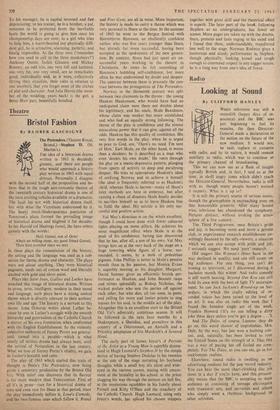Radio
Looking at Sound
By CLIFFORD HANLEY WHEN television was still a monolith (happy days of in-
nocence) and the BBC was just beginning to feel its muscles, the then Director- General made a declaration to the nation on the future of the new medium. It would not, he said, replace or compete with radio, and by its nature, it would remain auxiliary to radio, which was to continue as the primary channel of broadcasting.
This we can now see as a flash of insight typically British and, in fact, I said so at the time, in shrill angry tones which didn't reach the Director-General. Nevertheless. radio is still with us, though many people haven't noticed it recently. What is it up to?
It is still the primary source of serious music, though the gramophone is encroaching even on that honourable preserve. After many honest tries, television has abandoned the symphony. Pictures distract, without evoking the atmo- sphere of a live concert.
The Third Programme, once Britain's pride and joy, is becoming more and more a private club, or experimental research establishment un- wittingly financed by the telly-viewers; a situation which we can also accept with pride and joy, I seriously suggest. We need .'pure' research.
Old stagers like Woman's Hour have in no way declined in quality, and can still count on big audiences. For one thing, you can't do ironing to television, as I discovered during, a bachelor month this winter. And radio comedy is still worth hearing. Beyond Our Ken can still hold its own with the best of light TV entertain- ment. So can Jack Jackson's Round-up on Sat- urdays, in which the crafty editing of re-
corded voices has been raised to the level of an art. It was also on radio this week that I
found the funniest single act of the week, Frankie Howerd (It's no use telling a dirty joke these days unless you've got a degree .
And The Dales, of course. Lumme. they do go on, this weird shower of improbables. Mrs. Dale, by the way, has just won a knitting con- test, and, naturally, has been invited to tour the United States on the strength of it. That this was a way of paying her off fooled me com- pletely. For The Dales, as you can see, go in for rock bottom realism.
Elsewhere, sound radio is swelling as an advertising medium for the pop record industry. You can hear the same chart-climbing disc ten times in a day if you're keen, and this presum- ably means that the BBC is accepting its mass audience as consisting of teenage aficionados with transistor sets, and motorists and others who simply want a rhythmic background to other activities.


































 Previous page
Previous page